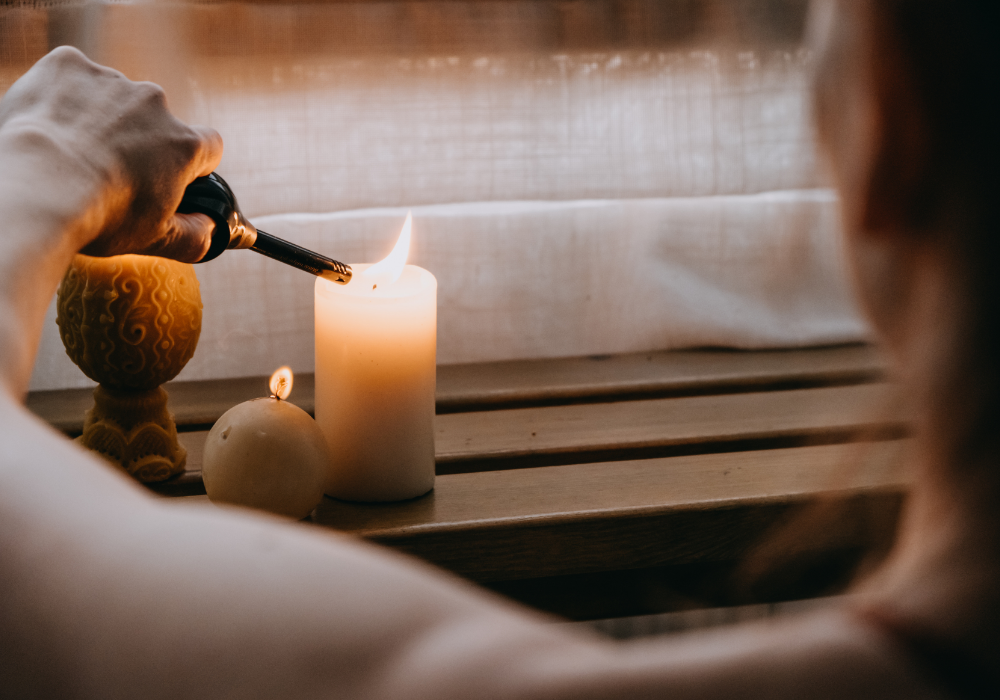What you do first sets the tone for everything after.

Mornings are marketed as productivity goldmines—stack your habits, drink your greens, journal, meditate, hustle. But somewhere along the way, the quest for the “perfect routine” became just another form of overload. For nervous systems already running hot, all that optimization can backfire fast. Instead of grounding you, it ramps you up before you’ve even had a chance to land.
A calmer day starts with a slower start. You don’t need ten steps before 9 a.m. to feel like you’re winning. You need space—less input, fewer demands, and practices that meet you where you are. Simplifying your mornings isn’t laziness. It’s nervous system hygiene. These small shifts create more ease, more clarity, and more energy for the things that actually matter. Because peace shouldn’t be the reward at the end of your checklist—it should be how the day begins.
1. Skip the scroll and give your brain space to wake up naturally.

Grabbing your phone before you even sit up might feel harmless, but it floods your nervous system with stimulation. News headlines, texts, ads, algorithms—your brain processes all of it before your feet touch the ground. Piedmont Healthcare notes that checking your phone right after waking can spike anxiety and stress by overwhelming your brain before it’s fully awake. Instead, leave your phone across the room or in another space entirely. Try giving yourself at least 20 minutes of tech-free time after waking. Let your thoughts unfold naturally.
You can journal, stretch, stare out the window—anything that reconnects you with your own pace. Those quiet moments aren’t wasted. They help you reclaim a sense of internal rhythm before the world’s noise takes over. Your day doesn’t need to start with urgency to be productive. It needs to start with you.
2. Let light—not alarms or screens—guide your first rhythms.

Your circadian rhythm is guided by light, not to-do lists. That means what you’re exposed to in the first hour of the day sets your biological tone. Overhead lights, blue phone screens, or total darkness all disrupt your body’s natural cues. Christine Blume and her co-authors explain in NCBI that missing out on natural light in the morning can leave you groggy and unfocused, even if you slept well the night before.
Instead, expose yourself to natural light as early as possible. Open the curtains, sit by a window, or step outside for just 60 seconds. If that’s not possible, use a warm-toned sunrise lamp that mimics dawn. This simple habit tells your body it’s time to shift into alertness—gently. You don’t have to flood your space with blinding brightness. Just give your body something real to orient to. Light wakes you up from the inside out.
3. Stop stacking stress by drinking caffeine before you’ve eaten.

Waking up and reaching for coffee might be routine, but if you’re doing it before food or hydration, you’re setting yourself up for a crash. Morning cortisol is already peaking naturally to get you alert—Natalie Olsen writes on Healthline that drinking coffee on an empty stomach may increase cortisol levels and make anxiety symptoms worse for some people.
Start instead with water. A glass first thing helps rehydrate tissues, flush overnight waste, and ease digestion into motion. If possible, pair your coffee with protein or fat—even something small like toast with nut butter or a hard-boiled egg. This gives your body a stable foundation to metabolize caffeine. You can still have your coffee. Just don’t weaponize it. When you treat your system with care, it actually gives you more energy—not less.
4. Choose presence over performance when building your routine.

Wellness culture has turned mornings into a checklist: green juice, gratitude journal, cold plunge, breathwork. And while those tools can be helpful, they’re not magic. For many people, they create pressure to perform rather than presence to feel.
Your nervous system doesn’t need a show. It needs regulation. Instead of chasing the perfect morning, experiment with slowing it down. Sit in stillness for 30 seconds. Let your tea cool in your hands. Stretch the way your body wants, not how a routine tells you to.
These are the moments that tell your system it’s safe to shift into the day. Simplicity isn’t laziness. It’s wisdom. And when your routine becomes more about connection than control, it stops being something to complete and starts being something that carries you.
5. Resist the urge to fix everything the moment you wake up.

For a lot of people, the brain kicks into planning mode the second they wake up. Tasks, worries, unfinished conversations—they flood in like a tide. But starting your day in strategy mode pulls you out of your body before it’s even fully awake. It feels productive, but it’s just another kind of stress loop.
Instead, try practicing a few minutes of pause. Breathe. Place your hand on your chest. Notice the weight of your body. Give yourself time to arrive in the day before reacting to it. Your thoughts will still be there—but you’ll meet them from a calmer baseline. This creates a subtle shift that makes a big difference. When your first action is rooted in presence, not panic, the entire tone of your day changes. Peace isn’t passive. It’s a choice to engage differently.
6. Let sound support your nervous system instead of spiking it.

That default alarm tone? It’s not just annoying—it’s designed to jolt you into alertness, mimicking an emergency. And even after it stops, the cortisol surge it triggers can linger. Many people start their mornings in a low-grade stress response just from how they’re woken up. It’s not a great foundation for peace.
Try replacing sharp alarms with nature sounds, gentle chimes, or music that builds gradually. You can also try starting the day in silence, especially if you wake into a house full of noise later. Give your ears—and your nervous system—a chance to catch up.
If you do enjoy sound in the morning, pick something that feels grounding: ambient playlists, soft instrumental music, or even slow podcasts that don’t overwhelm you with speed. Sound shapes your internal state more than you think. Make it work in your favor.
7. Slow down and let one thing happen at a time.

Mornings aren’t meant to be multitasked. Making coffee while checking email, getting dressed while doomscrolling, listening to a podcast while prepping breakfast—it all blends into a noisy, fragmented blur. The nervous system doesn’t thrive in constant split attention. It needs spaciousness, even in the little things.
Try doing one thing at a time, on purpose. Brush your teeth without checking your phone. Eat breakfast without background noise. Notice how your body feels when it’s not being pulled in five directions. You don’t need to be slow, but you do need to be present. That presence rewires your system to feel safe and steady. It makes everything feel less rushed—even when time is tight. The point isn’t to be perfect. It’s to experience the morning as something you’re actually in, not just speeding through on autopilot.
8. Anchor your body with the simple act of touching the ground.

When your thoughts are spinning, your body can ground you faster than any to-do list ever will. One of the simplest ways to do that? Bare feet on the floor. No app, no plan—just contact with something steady. Your nervous system reads that pressure as a cue: you’re here, you’re safe, and you’re allowed to settle.
Take a minute to stand barefoot and breathe. Feel your weight. Let your muscles drop. If you’re outside, stand in grass or on your porch. Indoors, try a grounding mat or just press your feet flat into the floor while you sit. You don’t need to meditate or “clear your mind.” You just need to arrive in your body. When your feet are anchored, the rest of you can stop bracing. It’s not a ritual—it’s a reset.
9. Drink water first so your system isn’t running on empty.

After 6–8 hours of sleep, your body wakes up dehydrated. And yet, most people go straight for caffeine, which pulls even more moisture out of the system. That combination—low hydration, high stimulation—makes you feel wired, foggy, and irritable before you even start your day.
Start instead with water. Room temperature is fine. Add lemon, salt, or minerals if you like, but plain is enough. This simple shift supports digestion, clears brain fog, and gives your cells what they need to actually absorb that morning energy.
You don’t have to give up coffee. Just give your body water first. Caffeine feels so much better when your system isn’t running on fumes. And hydration doesn’t have to be a “hack”—it can be a quiet, nourishing gift to your future self.
10. Notice when rushing is a pattern—not a real emergency.

If you’re constantly sprinting through your mornings, it might feel like just who you are. But often, the rush is a response to anxiety, not an actual lack of time. The body gets used to being in motion. Slowing down feels unfamiliar—so you speed up even when you don’t have to.
Notice where you create urgency out of habit. Is the rush real, or is it rehearsed? Can you leave ten minutes earlier or prep your bag the night before? Small adjustments can create big spaciousness. But the biggest shift is internal. You’re not lazy for wanting peace. You’re not weak for needing softness. You’re just learning how to live differently—one slower morning at a time.
11. Start small instead of waiting for the perfect system.

Most people delay simplifying their mornings because they think it has to look like a full overhaul. But peace doesn’t need a 30-day plan. It needs one action. One gentler choice. One less stimulation. Your routine doesn’t have to impress anyone. It just has to support you. Maybe that means lighting a candle before you check your phone. Maybe it means doing nothing for five minutes. Maybe it means swapping your usual alarm tone for a soft chime and calling that progress.
You don’t need a perfect system to have a better morning. You just need to start where you are, with what you have. From there, your nervous system will tell you what it wants next.